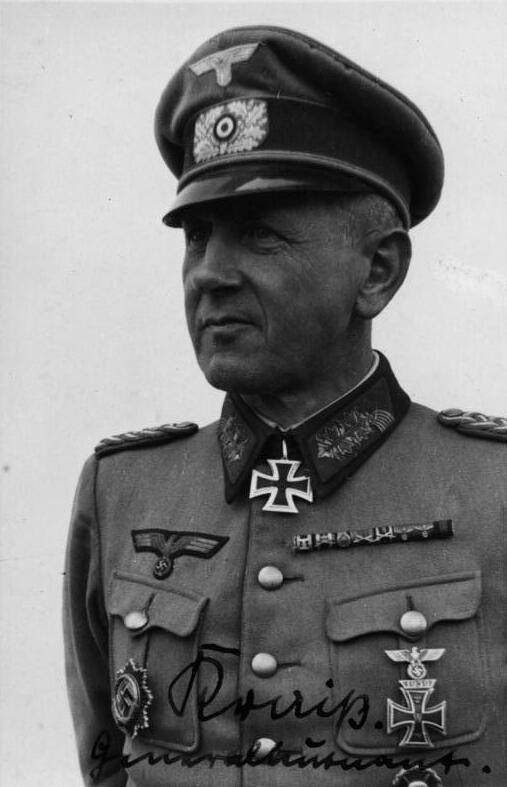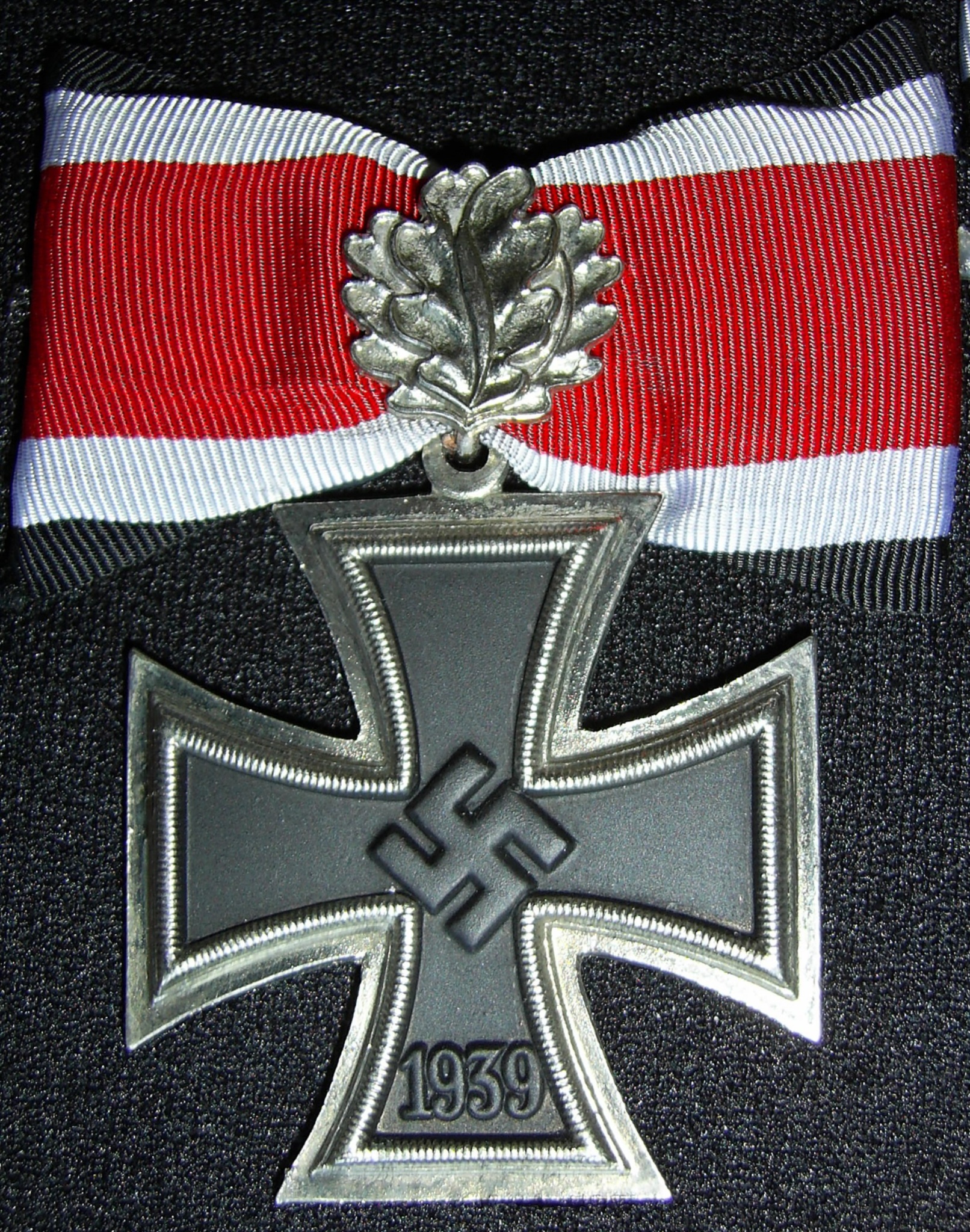1. Overview

Dietrich Kraiss (Dietrich KraissGerman, 16 November 1889 - 6 August 1944) was a distinguished German general who served during World War I and World War II. Renowned for his resilience and tactical acumen, he became a recipient of the prestigious Knight's Cross of the Iron Cross with Oak Leaves. Kraiss is particularly noted for his command of the 352nd Infantry Division during the Normandy landings, where he executed a strategic withdrawal against direct orders from Adolf Hitler to establish a more defensible position, significantly hindering Allied advances for several weeks. His military career spanned from his initial commission into the Kingdom of Württemberg's infantry to his death in action during the fierce fighting in Normandy.
2. Early Life and Military Enlistment
Dietrich Kraiss's early life and entry into military service laid the foundation for his extensive career, which included significant involvement in World War I.
2.1. Birth and Early Years
Dietrich Kraiss was born on 16 November 1889 in Stuttgart, Germany. Details of his early upbringing are limited, but his subsequent military career indicates a dedicated path from a young age.
2.2. Military Enlistment and World War I
Kraiss began his military journey on 24 March 1909, when he was commissioned as a Second Lieutenant into the 8th Infantry Regiment "Grand Duke Friedrich of Baden," No. 126, of the Army of Württemberg. Upon the outbreak of World War I, he served on the Western Front with this regiment. Initially commanding a platoon, he later served as a company commander and was involved in various regimental staff roles, including a machine-gun officer and a battalion commander. He was promoted to first lieutenant on 18 June 1915, and further advanced to Captain on 15 July 1918. For his contributions and service during the war, Kraiss received several significant awards, including the 1st and 2nd Classes of the Iron Cross, the House Order of Hohenzollern with swords, the Order of the Zähringer Lion Knight Second Class, the Military Merit Order of Württemberg, and the Wound Badge in black.
3. Interwar Period
Following the conclusion of World War I, Dietrich Kraiss continued his military career within the Reichswehr (ReichswehrGerman) of the Weimar Republic, where he progressed through various command and instructional roles, steadily advancing in rank.
After the war, Kraiss remained in the military, serving as a company commander in several infantry regiments. On 30 August 1919, he became a company commander in the 26th Rifle Regiment, and on 1 October 1920, he transferred to the 25th Rifle Regiment in the same capacity. From 1 January 1921, he served as a company commander in the 13th Infantry Regiment. His expertise led to his assignment as an instructor at an infantry school in Dresden, a position he held from 1925 to 1928. After his instructional duties, he returned to command a company in the 13th Infantry Regiment on 1 October 1928.
On 1 May 1931, Kraiss was promoted to major and subsequently transferred to the Ministry of the Reichswehr (RWM) in Berlin, where he served until the end of 1934. With the expansion of the German military, he was promoted to Lieutenant Colonel on 1 October 1934, and assumed command of a battalion within an infantry regiment in Ludwigsburg, in his native Württemberg. On 15 October 1935, he took command of a battalion within the 119th Infantry Regiment. He achieved the rank of Colonel on 1 March 1937, and by 11 October 1937, he was appointed commander of the 90th Infantry Regiment, stationed in Hamburg.
4. World War II
Dietrich Kraiss played a significant role in various campaigns during World War II, commanding divisions on both the Eastern and Western Fronts.
4.1. Polish and French Campaigns
At the outset of World War II, Kraiss commanded the 90th Infantry Regiment during the Invasion of Poland in September 1939. Following the Polish campaign, his unit was redeployed to Germany to prepare for the invasion of France. From May 1940, his regiment participated as part of the 20th Infantry Division in the occupation of the Netherlands and France. On 1 February 1941, Kraiss was promoted to Major General. In March 1941, he briefly entered the Führerreserve (FührerreserveGerman) after handing over command of his regiment to Colonel Erich Jaschke.
4.2. Eastern Front Command
From July 1941 to March 1943, Kraiss was given command of the 168th Infantry Division, which was engaged in intense combat on the Eastern Front as part of Operation Barbarossa. His leadership of the division during the Third Battle of Kharkov earned him the Knight's Cross of the Iron Cross, awarded on 23 July 1942. On 1 October 1942, he received his final promotion to the rank of Lieutenant General. In April 1943, Kraiss assumed command of the newly formed 355th Infantry Division. This division, however, suffered severe losses during confrontations with the Red Army near Merefa and was subsequently disbanded on 9 November 1943.
4.3. Normandy Campaign
From November 1943, Dietrich Kraiss was appointed commander of the newly established 352nd Infantry Division, which comprised approximately 7,400 personnel. This division, along with six other German divisions, was positioned in Normandy to counter the anticipated Allied invasion. Kraiss's division was tasked with defending key coastal areas, including Omaha Beach and Gold Beach, during the Normandy landings.
Upon the Allied invasion on 6 June 1944, Kraiss made a critical strategic decision. Disregarding Adolf Hitler's explicit orders for his troops to hold their positions at the coastline at all costs, Kraiss ordered his division to withdraw approximately 12 mile (20 km) inland to a more defensible line. This bold move allowed his forces to establish stronger defensive positions, effectively resisting the Allied forces in their sector for several weeks and significantly slowing their advance from the beaches. His command during this period is recognized for its tactical effectiveness despite overwhelming Allied air superiority and numerical advantage.
5. Death
Dietrich Kraiss was fatally wounded during the intense fighting in the Normandy campaign. On 2 August 1944, he sustained a severe injury by Allied bombing near Saint-Lô, specifically in the area south of Saint-Lô. He succumbed to his wounds four days later, dying on 6 August 1944, at an emergency aid station near Perron, close to Fromprond. His death occurred amidst the fierce combat that characterized the Allied advance through Normandy. Posthumously, he was awarded the Knight's Cross of the Iron Cross with Oak Leaves on 11 August 1944, a testament to his distinguished service and leadership.
6. Ranks and Assignments
Dietrich Kraiss's military career was marked by steady advancement through the ranks and a variety of command positions.
| Date | Rank | Assignment |
|---|---|---|
| 24 March 1909 | Second Lieutenant | Commissioned into 8th Infantry Regiment "Grand Duke Friedrich of Baden", No. 126 |
| 18 June 1915 | First Lieutenant | |
| 15 July 1918 | Captain | |
| 30 August 1919 | Company Commander, 26th Rifle Regiment | |
| 1 October 1920 | Company Commander, 25th Rifle Regiment | |
| 1 January 1921 | Company Commander, 13th Infantry Regiment | |
| February 1925 | Detached to Infantry School | |
| 1 October 1928 | Company Commander, 13th Infantry Regiment (return from Infantry School) | |
| 1 May 1931 | Major | Transferred to Ministry of the Reichswehr (RWM) |
| 1 October 1934 | Lieutenant Colonel | Battalion Commander, Ludwigsburg Infantry Regiment |
| 15 October 1935 | Battalion Commander, 119th Infantry Regiment | |
| 1 March 1937 | Colonel | |
| 11 October 1937 | Commander, 90th Infantry Regiment, Hamburg | |
| 15 March 1941 | Reserved Officer, 10th Military District | |
| 1 February 1941 | Major General | |
| 8 July 1941 | Commander, 168th Infantry Division | |
| 9 March 1943 | Relinquished command of 168th Infantry Division | |
| 25 March 1943 | Reserved Officer, 10th Military District | |
| 14 May 1943 | Commander, 355th Infantry Division | |
| 6 November 1943 | Commander, 352nd Infantry Division | |
| 1 October 1942 | Lieutenant General |
7. Awards and Decorations
Dietrich Kraiss was highly decorated for his service in both World War I and World War II, receiving numerous military honors.

- Iron Cross 2nd Class: Awarded in World War I.
- Iron Cross 1st Class: Awarded on 7 June 1915 during World War I.
- House Order of Hohenzollern with swords: Awarded during World War I.
- Order of the Zähringer Lion Knight Second Class: Awarded during World War I.
- Military Merit Order of Württemberg: Awarded during World War I.
- Wound Badge in black: Awarded during World War I.
- Clasp to the Iron Cross (1939) 2nd Class: Awarded on 18 September 1939.
- Clasp to the Iron Cross (1939) 1st Class: Awarded on 3 October 1939.
- German Cross in Gold: Awarded on 28 February 1942, as a Major General and commander of the 168th Infantry Division.
- Knight's Cross of the Iron Cross: Awarded on 23 July 1942, as a Major General and commander of the 168th Infantry Division (the 1047th recipient).
- Knight's Cross of the Iron Cross with Oak Leaves: Awarded posthumously on 11 August 1944, as a Lieutenant General and commander of the 352nd Infantry Division (the 549th recipient).
8. Legacy and Assessment
Dietrich Kraiss's military career, particularly his actions during the critical Normandy campaign, left a notable mark on military history.
8.1. Military Leadership and Impact
Kraiss's command abilities were characterized by a pragmatic and independent tactical judgment. His most impactful decision came during the Normandy landings when he defied Hitler's directive for a rigid coastal defense. His order to withdraw the 352nd Infantry Division approximately 12 mile (20 km) inland allowed his forces to establish a more effective defensive line. This strategic retreat, though insubordinate, was crucial in enabling his division to resist the Allied advance from Omaha Beach and Gold Beach for several weeks. This action demonstrated his ability to prioritize tactical reality over political ideology, effectively buying precious time for the German defense and highlighting his keen understanding of battlefield dynamics. His leadership in this desperate situation is often cited as a testament to his military acumen.
8.2. Posthumous Recognition
The posthumous awarding of the Knight's Cross of the Iron Cross with Oak Leaves on 11 August 1944, underscored the German high command's recognition of Dietrich Kraiss's valor and significant contributions, particularly during the challenging period of the Normandy campaign. This prestigious decoration, one of the highest awards in Nazi Germany, solidified his legacy as a highly regarded and effective frontline commander who made critical decisions under extreme pressure.